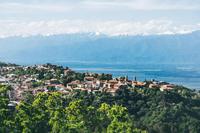The Mtkvari River, a significant watercourse in the South Caucasus, flows through Georgia, defining the contours of its landscape and culture. Originating in Turkey, it winds through Georgia before eventually merging with the Caspian Sea in Azerbaijan. This article delves into the multifaceted aspects of the Mtkvari, exploring its geographical significance, historical relevance, cultural impacts, economic contributions, and its role in Georgian tourism.
Geographical Overview
The Mtkvari, also known as the Kura River, begins its journey in northeastern Turkey, near the town of Kars. It enters Georgia at the small town of Posof and flows southeast towards the nation's capital, Tbilisi. Covering a length of approximately 1,515 kilometers (941 miles) overall, with about 351 kilometers (218 miles) within Georgia, the Mtkvari is the longest river in the Caucasus region.
The river’s basin, spanning an area of about 188,000 square kilometers (72,589 square miles), supports a diverse ecosystem. Its major tributaries include the Aragvi, Alazani, and Iori rivers, each contributing to the Mtkvari's flow and ecological diversity.
Historical Context
The Mtkvari River has been a cradle of civilization for millennia. Ancient settlements along its banks date back to the Bronze Age. Historically, the river served as a vital trade route, connecting the Caucasus with the larger Eurasian trade networks. It facilitated the exchange of goods and ideas, shaping the region's cultural and economic landscape.
In more recent history, the Mtkvari played a crucial role in the industrialization of Georgia, particularly during the Soviet era. The construction of hydroelectric power stations along its course helped propel the country's economic development.
Cultural and Social Impact
The Mtkvari has been a muse for Georgian poets, writers, and artists, symbolizing both the nation's enduring spirit and the ebb and flow of its history. Its presence is vividly depicted in Georgian literature and folklore.
Life along the Mtkvari is characterized by a blend of traditional and modern lifestyles. The riverbanks host numerous festivals and events, reflecting the rich cultural tapestry of Georgia.
Economic Significance
The Mtkvari plays a pivotal role in Georgian agriculture. Its waters irrigate vast tracts of agricultural land, essential for crops like grapes, essential to Georgia's famed wine industry.
The river’s flow has been harnessed for hydroelectric power, a significant contributor to Georgia's energy sector. This sustainable energy source is pivotal for the country's economic stability and development.
Mtkvari in Georgian Tourism
For travelers, the Mtkvari offers a blend of natural beauty and historical sites. Key attractions include the ancient city of Mtskheta, near the confluence of the Mtkvari and Aragvi rivers, and Tbilisi’s picturesque old town, which the river bisects.
The river also caters to adventure tourism, offering activities like rafting and fishing. The tranquil riverside areas are perfect for leisurely walks, picnics, and cultural exploration.
Environmental Concerns and Conservation Efforts
The Mtkvari faces environmental challenges, including pollution and the impact of dam construction on its ecosystem. These issues pose risks to the river’s biodiversity and the communities depending on it.
In response, various conservation initiatives have been implemented. These aim to protect the river’s ecosystem, promote sustainable use of its resources, and ensure the Mtkvari remains a vibrant part of Georgia’s natural heritage.
Conclusion
The Mtkvari River, with its rich history, cultural significance, economic value, and natural beauty, stands as a cornerstone of Georgian identity. It encapsulates the essence of the nation’s past, present, and future, remaining an integral part of its landscape and the lives of its people. As a travel destination, it offers a unique window into the heart of Georgia, inviting visitors to explore its many facets.

 Rivers of Georgia
Rivers of Georgia
 Pankisi Valley
Pankisi Valley
 Alazani Valley
Alazani Valley




